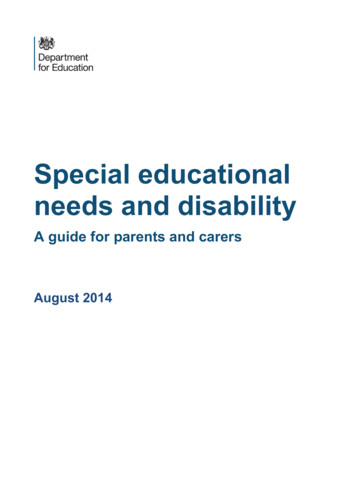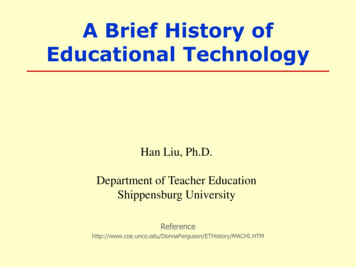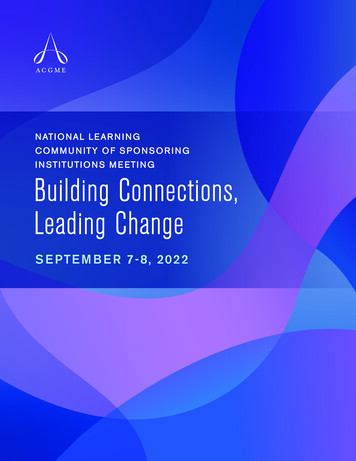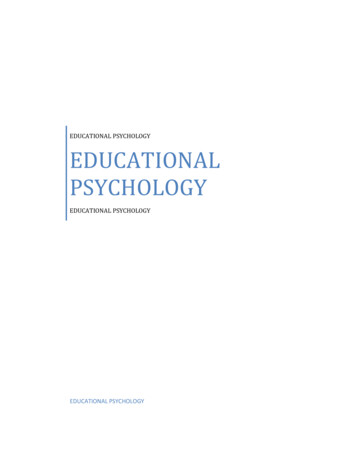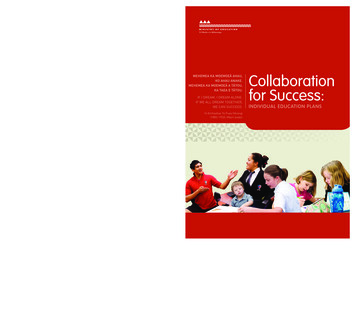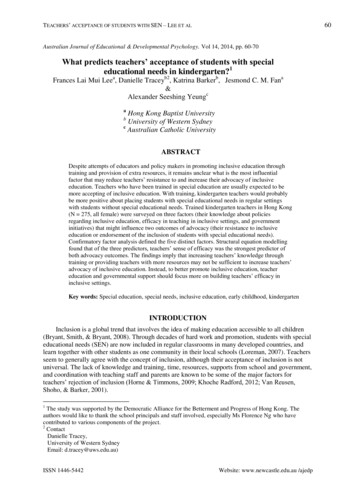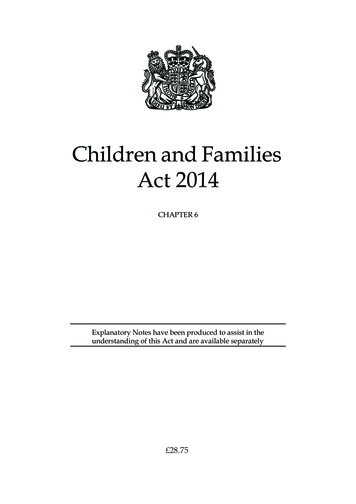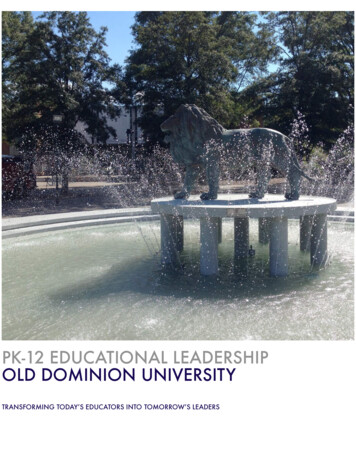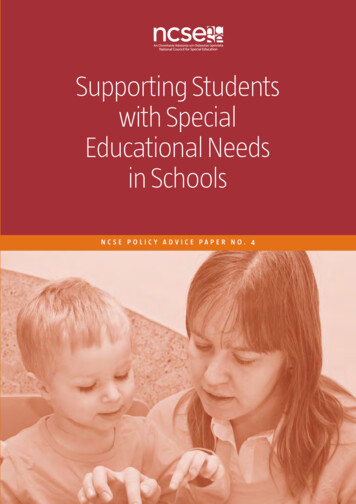
Transcription
Supporting Studentswith SpecialEducational Needsin SchoolsNCSE POLICY ADVICE PAPER NO. 4
NCSE POLICY ADVICE PAPERSupporting Studentswith SpecialEducational Needsin SchoolsMay 2013
NCSE 2013National Council for Special Education1–2 Mill StreetTrimCo. MeathT: 046 948 6400F: 046 948 6404www.ncse.ie
ContentsIndex of Tables .viForeword.viiMessage from Sydney Blain.ixAbbreviations. xExecutive Summary.3A new model. 6Pending implementation of new model. 8Further recommendations. 91Introduction.151.1Terms of reference.151.2State investment.151.3Continuum of provision.161.4NCSE policy advice.181.5Structure of paper.192Examination of Research and Policy Documentation. 232.1Introduction. 232.2Parental views on how students with special educational needs aresupported in Irish schools. 232.3Assessment and identification of students with special educationalneeds. 242.3.1Purpose of assessment for students with special educational needs.242.3.2Limited availability of assessments. 262.4Models of resource allocation. 262.4.1Link between assessment of disability and allocation of resources.272.4.2Current resource allocation system. 302.5Monitoring and measuring outcomes for students with specialeducational needs. 312.5.1Measuring outcomes: What, how, who?. 312.5.2Individual education plans (IEPs).332.5.3Monitoring outcomes. 342.5.4National database.352.6Teacher education. 352.6.1Developments in teacher education in Ireland. 36Supporting Students with Special Educational Needs in Schoolsiii
iv2.6.2Further professional development identified as required forteachers in Ireland.372.7Support staff in classrooms. 393Identification and Assessment of Special Educational Needs.453.1Introduction. 453.2The current system of identification and assessment. 453.2.1Before school. 453.2.2At school – continuum of support. 453.3Review of the current system. 463.3.1Summary of views expressed during consultation. 463.3.2Strengths of the system. 463.3.3What changes does the system require?.473.4NCSE policy advice: identification and assessment of specialeducational needs. 473.4.1The EPSEN Act, 2004.473.4.2Why change the current model?. 493.4.3One national system of assessment. 514Supports Required by Students with Special Educational Needsin Schools. 554.1Introduction. 554.2What supports are currently available?. 554.2.1Educational supports.554.2.2Health supports. 564.3Review of current supports. 564.3.1Summary of views expressed during consultation. 564.3.2Strengths of the current system. 564.3.3What requires to be reviewed?.574.4NCSE policy advice on supports required by students with specialeducational needs in schools. 604.4.1Professional competence. 614.4.2Early intervention. 644.4.3Supports required by some children with special educational needsto access education in the school setting. 65Supporting Students with Special Educational Needs in Schools
5Resource Allocation.835.1Introduction. 835.2Current model for allocating additional teaching and care supports. 835.2.1Allocation of additional teaching supports. 835.2.2Allocation of additional care supports. 835.2.3Other supports. 845.3Review of the current system. 845.3.1Summary of views expressed during the consultation process. 845.3.2Strengths of the current system. 845.3.3What requires to be reviewed in the system. 855.4NCSE policy advice. 875.4.1Why change?.875.4.2Education for Persons with Special Educational Needs Act 2004. 885.5Proposed new resource allocation model for mainstream classes. 895.5.1Essential elements required to underpin a new model of resourceallocation. 895.5.2Enrolment policies and practices. 895.5.3Allocation and deployment of resources in mainstream schoolsshould be in line with students’ learning needs and outcomes. 915.5.4Robust indicators of special educational needs must be developedand agreed. 945.5.5Potential risks and benefits pertaining to the introduction of thenew model. 955.5.6Short-term changes to strengthen and improve current system.975.5.7Designation of special schools as national schools. 1025.5.8Access to special schools and classes. 1035.5.9Allocation of teaching supports to special schools and classes.104Appendices . 109Appendix 1 – Setting the Scene: Historical and Current Context.109Appendix 2 – The Consultation Process.142Appendix 3 – Framework for the Professional Development of Teachers.158Appendix 4 – Summary of Support Needs.163Appendix 5 – List of Recommendations.165References .172Supporting Students with Special Educational Needs in Schoolsv
Index of TablesviTable 1:Expenditure on special education 2004-11.16Table 2:Numbers of students in special schools and classes as % of totalschool population. 17Table 3:Teaching hours allocated per category of disability.115Table 4:Staffing ratios for each disability category.115Table 5:Approximate number of students for whom resource teaching hours(RTHs) were allocated to schools for low incidence disabilities for theacademic year 2012-13. 118Table 6:No of special classes for each disability category 2012–13. 119Table 7:Designation of special schools.120Table 8:Numbers of new applications approved for assistive technology (AT)for academic year 2012-13 by disability category.121Table 9:Primary school capitation rates 2012. 123Table 10:Capitation expenditure. 123Table 11:Number of students receiving transport support for academicyear 2012–13.124Table 12:Accommodation suites for primary and post-primary schools. 125Table 13:Maximum grant for ancillary services. 127Table 14:Reasonable accommodation in certificate exams.129Table 15:Breakdown of approved funding for SESS for 2010-12. 135Table 16:Breakdown of funding for SESS – 2012. 135Table 17:Schools included in the DEIS scheme.136Table 18:From SERC to here .138Table 19:Special schools by county and category.138Table 20:Participants in consultation process. 157Table 21:Summary of support needs and the type of support that may berequired.163Supporting Students with Special Educational Needs in Schools
ForewordThe NCSE has a vision of a society where children and adults with special educationalneeds receive an education that enables them achieve their potential. We are verypleased therefore to respond to the Minister’s request for advice on how students withspecial educational needs should, in the future, be supported in schools.The timing of this request was particularly apt given that it is now twenty years since the SpecialEducation Review Committee (SERC) published its landmark report on educational provisionfor children with special educational needs. The influence of this report on the developmentof State policy over subsequent years is widely acknowledged. There has been significantlyincreased State investment in the development of educational services and considerableprogress made in the inclusion of students with special educational needs in schools since1993. We particularly welcome that the current NCSE strategic review has taken placeunder the chairmanship of Sydney Blain, who was a member of this committee.We place great importance on our responsibility to provide the Minister with expert,independent, evidence-informed policy advice on special education. We are particularlyconscious of the far-reaching consequences this advice could have for the provision ofeducational services to future generations of Irish children with special educational needs.We took great care to consult widely in the preparation of this advice and to listen to whatparents, students, teachers and other stakeholders were telling us about what workedwell in the system and what needed to be changed. Our advice is also informed by currentnational and international research to ensure a firm evidence basis for our proposals.We are aware that any proposal to change the current system has the potential to evokeconsiderable anxiety among schools and parents who may fear that any change couldadversely impact their child or school. We would like to emphasise that our proposalswere developed to serve the interests of students with special educational needs ratherthan those of the system. If the Minister accepts our proposals, we also stress the importance of devoting sufficient time to consultation with stakeholders in the developmentand refinement of a new model.We believe that the EPSEN Act, 2004 continues to offer the most effective route to assessment and educational planning for children with special educational needs and we havecalled on the Minister to implement the Act in full, as soon as resources become available.Pending its full commencement, we consider our proposals, if implemented, are in keeping with the Act’s principles and intent and are intended to ensure the best use of availableresources.I would like to thank all those who contributed to this policy advice in any way and particularly those who took part in our consultation meetings. We hope that our advice is of assistance to the Minister in developing further policy in this area.Teresa GriffinMay 2013Supporting Students with Special Educational Needs in Schoolsvii
viiiSupporting Students with Special Educational Needs in Schools
Message from Sydney BlainMany people made a substantial contribution to the development and refinement of thisimportant policy advice paper during 2012. Its proposals were informed by a wide-rangingconsultative process which included parents, SNAs, students, teachers, principals, NEPS,SENOs, HSE professionals, school management bodies, voluntary bodies and advocacygroups. The NCSE also sought advice from our Consultative Forum whose membershipcomprises representatives of the education stakeholders. All of these discussions shapedand guided our work as we formulated final proposals for submission to the Minister.I would particularly like to acknowledge the tireless commitment of my fellow Councilmembers who devoted many hours to discussing and debating the important issuesinvolved. I am particularly appreciative that all of these discussions were conducted in anatmosphere characterised by a mutual respect of different view-points and a constructivedetermination to complete the task within a reasonable time-frame. I would also like tothank the NCSE executive for their work in undertaking the consultation process and indrawing together the views of Council members in this final paper.It is hard to believe that twenty years have gone by since the report of the SERC committeewas published. As a member of that committee, I am very pleased to have had the opportunity to be part of this current NCSE strategic review. I believe that our proposals, if implemented, have the potential to bring about significant improvements in the education ofchildren with special educational needs in our schools over the coming years.Sydney BlainChairperson NCSE2006-2012Supporting Students with Special Educational Needs in Schoolsix
TEDPDSTRACERTHSENOSERCSESSSevere EBDSNATESUNCRPDUNESCOVFMWHOxApplied behaviour analysisAttention deficit hyperactivity disorderAutistic spectrum disordersAssistive technologyChild and Adolescent Mental Health ServiceContinuing professional developmentDisability access route to educationDepartment of Children and Youth AffairsDepartment of Education and SkillsDelivering Equality of Educational Opportunity in SchoolsDepartment of HealthEuropean Agency of Development in Special Needs EducationEmotional disturbance/behavioural disorderEarly childhood care and educationEducation for Persons with Special Educational Needs Act, 2004Economic and Social Research InstituteFurther Education and Training Awards CouncilGeneral allocation modelGeneral learning disabilityHealth Service ExecutiveHome school community liaisonInformation and communications technologyIndividual education planIndividual profile and learning programmeIrish sign languageInitial teacher educationLearning support/resource (teacher)National Association of Boards of Management in Special EducationNational Behaviour Support ServiceNational Council for Curriculum and AssessmentNational Council for Special EducationNational Disability AuthorityNational Educational Psychological ServiceNational Educational Welfare BoardNational Framework of QualificationsOrganisation for Economic Co-operation and DevelopmentOffice for Standards in Education, England, UKProfessional Development Service for TeachersReasonable accommodation in certificate examinationsResource teaching hoursSpecial educational needs organiserSpecial Education Review CommitteeSpecial Education Support ServiceSevere emotional disturbance/behaviour disorderSpecial needs assistantTeacher education sectionUnited Nations Convention on the Rights of Persons with DisabilitiesUnited Nations Educational Scientific and Cultural OrganisationValue for moneyWorld Health OrganisationSupporting Students with Special Educational Needs in Schools
Executive Summary
1 Executive SummaryExecutive SummaryThe National Council for Special Education (NCSE) supports an inclusive education systemthat enables children and adults with special educational needs to achieve their potential.One of our key functions is to provide the Minister for Education and Skills with expert,independent, evidence-informed policy advice on special education for children andadults. In 2012, we were requested to provide policy advice on how students with specialeducational needs should, in the future, be supported in schools.Our advice is informed by the following six principles:Principle 1: All children, irrespective of special educational need, are welcome andable to enrol in their local schools.1Principle 2: All educational supports are allocated equitably to schools in line withthe educational needs of students.Principle 3: All students with special educational needs have access to availableeducational supports in line with their needs.Principle 4: Students with special educational needs have an individualisedassessment which informs teaching and learning and forms one partof an ongoing and cyclical process of assessment, intervention andreview of outcomes.Principle 5: Available resources are used to maximum effect to drive improvedoutcomes for children; State services work together to achieve this.Principle 6: Parents’ role as the natural and primary educators of the child isrespected.The advice was prepared following a widespread process of consultation with the education partners as well as a review of relevant national and international research findingsto ensure that a comprehensive approach to developing the policy advice was adopted.In developing this policy advice, we were conscious that meeting students’ identified educational needs was the paramount consideration which must be kept at the centre of proposals and recommendations. It is our view that the most effective route to the assessmentand planning for students with special educational needs lies in the full implementation ofthe Education for Persons with Special Educational Needs Act (EPSEN) 2004 (Governmentof Ireland, 2004) which provides a blueprint for supporting and educating these students.We therefore recommend that the EPSEN Act is fully implemented as soon asresources permit.We realise that the current fiscal position means the Government has no access to theresources required to enable a full implementation of EPSEN in the short to medium term.Accordingly, our policy advice has been developed in keeping with the spirit and aspira1The NCSE considers that this is an important principle, while recognising that some children with complexneeds may require a more supportive special school or special class placement.Supporting Students with Special Educational Needs in Schools3
Executive Summarytions of EPSEN, and is intended to move the educational system towards the Act’s principles and intent, pending its full implementation.The State’s annual expenditure on special education increased from 468 million in 2004to 1.3 billion in 2011, representing a percentage increase of 178 per cent at a time whenthe State’s total income from tax returns fell by 1.5 billion ( 35.7 billion in 2004 to 34.2billion in 2011). This significant investment in providing supports for students with specialeducational over the last decade has transformed the ability of schools to educate them.It is important to acknowledge schools’ contribution to the inclusion of students withspecial educational needs during this period. Groups consulted also viewed the establishment of the NCSE and the local role of the special educational needs organiser (SENO) aspositive developments.There was general agreement that many students with special educational needs arethriving and making significant progress in school. There was agreement that the supportsalready in place in schools are those which continue to be required so that students withspecial educational needs are enabled to participate in, and benefit from, education andgenerally to fulfil their potential. These supports include: Approximately 10,000 learning support and resource teachers up from approximately 1,300 in 1993; 630-plus special classes up from 390 in 1993 (1993 figure includes special classesfor children from the Travelling community whereas the current figure refers only tospecial classes for children with special educational needs arising from a disability); 10,000-plus special needs assistants (SNAs) up from fewer than 100 in 1993; Additional funding provided to special schools and mainstream schools with specialclasses; National Educational Psychological Service; Specialist training for teachers in special education; Assistive technology; School building adaptations; Specialist equipment; School transport (the average cost of providing school transport is 1,020 at primarylevel, 958 at post-primary level and 9,087 for students with special needs). Theoverall annual transport scheme costs 169 million and it is estimated that about 34per cent of the budget ( 58 million) is spent on special needs transport supporting8,000 children (DES, Transport Section).However, despite all the positive aspects, there is still room for improvement. The mostfundamental need of all is that a child can be enrolled in a school. While most schoolsdo welcome and enrol children with special educational needs, the NCSE is disappointedthat some schools erect overt and/or ‘soft’ barriers to prevent or discourage parents fromenrolling their children in these schools.We consider that schools are funded and resourced to provide an educational service toall children in their locality. Exclusionary practices cannot be permitted in any nationalsystem of education.4Supporting Students with Special Educational Needs in Schools
Executive SummaryThe NCSE strongly recommends that the DES introduce a robust regulatoryenrolment framework for schools to ensure that: Every child with special educational needs is protected from enrolmentpractices or policies with overt or covert barriers that block his/her access toenrolment in the school. Every child with special educational needs may enrol in the nearest schoolthat is or can be resourced by the NCSE to meet his/her needs. A school must enrol a student with special educational needs if so directed bythe SENO on the basis that the school will be provided with resources in linewith national policy. A school must establish a special class if so requested by a SENO.There are advantages in the current approach to the identification and assessment ofspecial educational needs and the provision of additional supports. Schools and parentsparticularly value the link that currently exists between diagnosis of disability and sanctioning of additional resources for low incidence disability. In their view this provides alevel of certainty that the required resources will be in place for individual students withspecial educational needs.There are also significant difficulties with the current approach. Research studies consistently highlight the need for early and appropriate intervention to promote optimal educational outcomes. The current system of additional resource allocation for low incidencedisabilities is dependent on a diagnosis of disability. It also allocates the same level ofresources for every student within each disability category even though the supportsrequired for one student could be significantly greater or lesser than another. NCSEcommissioned research studies suggest the diagnosis of disability should not be theprerequisite determinant for the allocation of additional resources for students with specialeducational needs. They should instead be based on an assessment of student needs.The NCSE is greatly concerned that the lack of health services, alongside limited accessto educational psychological assessments, means some children with special educationalneeds are unable to access the professional assessments on which resources for low incidence disabilities are based. We are also concerned that many assessments simply statea child’s disability rather than informing and guiding a child’s development, teaching andlearning. The Health Service Executive (HSE) professionals consulted were particularlyconcerned at being pressurised to diagnose a child with a disability when the need forsuch a diagnosis was to obtain an educational service rather than indicated as required forhealth or social reasons. They considered their time and expertise would be more effectively used in providing clinical interventions and support as well as advising parents andschools on how best to support the child’s development and learning.The NCSE has concluded that the current support allocation model does not provide allchildren with equitable access to educational supports. It may reinforce advantage andconfirm disadvantage – those who can, or whose school can, afford to pay for privateSupporting Students with Special Educational Needs in Schools5
Executive Summaryassessments can access additional supports immediately, where eligible; those whocannot are deprived of such supports until they can be assessed through the public system.Concern was also expressed – in the consultation process and directly to the NCSE – thatresources are not being allocated to greatest effect. The policy of linking allocation oflearning support posts to number of class teachers in the school, may in general seemreasonable and fair. However, each school’s need for such support can vary significantly,irrespective of teacher numbers.The NCSE considers that the model for allocating additional supports to schools should bechanged because: Students with special educational needs do not have equitable access to formalassessments which means in turn that they do not have equitable access to teaching,care and other supports. The allocation of additional State educational resources should not depend on aparent’s ability to pay for professional assessments or the proximity to HSE supports. The level of additional supports provided should be in line with the needs of the childrather than being linked to a diagnosis of a particular category of disability. At a time of scarce resources, all teaching posts should be allocated in line withprofiled educational need within a school rather than the number of class teachers orstudents within a school.The NCSE believes:A new model should be developed for the allocation of additional teaching
Education Review Committee (SERC) published its landmark report on educational provision for children with special educational needs. The influence of this report on the development
